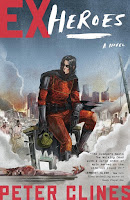As has come up here once or twice or thrice, I like to watch bad movies (and usually offer a bunch of half-drunken live tweets as I do). I’m a big believer in learning from the bad stuff over copying the good stuff. Plus it’s kinda fun, in a masochistic sort of way. I mean, statistically, somebodymust’ve made a good shark movie, right?
Yeah, sure, Jaws, but I’m thinking in the forty years since then…
Anyway, a few times now I’ve noticed an issue that I’ve also caught in some literary fiction. By which I just mean “fiction on the page,” to distinguish it from cinematic fiction. It can be brutal in movies, but it stings in books, too. So I wanted to blab on for a minute or three about an aspect of pacing that seems to get overlooked a lot.
It’s a very natural part of storytelling to shift between locations or timeframes. At a particularly dramatic moment, we may leap over to a parallel storyline, or maybe flash back to a key moment that happened hours, weeks, or even years ago. Depending on our chosen genre, we may leap across centuries or galaxies.
And that’s cool. We all love it when a story covers a lot of ground and shifts between points of view. It lets us tell multiple stories and tie them together in clever ways, or to get information across using different methods.
But…
There are still some things I need to keep in mind as a storyteller. As beings that live more-or-less linear lives, we tend to notice when there’s a jarring difference in the passage of time. We understand that time spent here is also time spent there… even if we don’t see it happen.
That’s the thing to keep in mind. Just because we cut from scene A to scene B, it doesn’t mean scene A stops. Time still passes. Characters keep doing things. They continue to talk and discuss and explain and comment on things.
It’s not unusual to skip over swaths of time in a narrative. As I was recently reminded, we don’t need to see the four-day cross country trip if… well, nothing happens during those four days. No matter how beautiful the language or evocative the imagery is, if nothing happens to further the plot, it’s an irrelevant scene. Or chapter, as it was in my case.
But here’s the thing I need to remember. That time is still passing. My character may get on the bus at the end of chapter six and get off at the start of chapter seven, but that doesn’t mean the journey was instantaneous. There were meals and probably some conversations and a few bathroom breaks and some sleeping.
More to the point, it wasn’t instantaneous for everyone else. Four days passed for all the other characters, too. Time progressed for everyone.
Now, I can fudge this a bit in a book. It’s much harder to do in a movie, but in a book we can be made to understand that time didcome to a halt between chapters nine and eleven. We went off to deal with something else for fifteen pages, yet when we come back everyone’s still standing here with pistols drawn, cards on the table, or awkward confessions hanging in the air.
But…
Yeah, another but. Sorry.
Whenever I have one of these cutaways, in prose or on screen, I need to consider the pacing and flow. My readers will need to switch gears and jump into a new headspace for this different scene with different characters. Sometimes it can be fantastic. Cutting away can increase tension, ramp up the stakes, or just heighten emotions. Done right, it can take my readers from screaming to laughing and back.
Done wrong… and it just reminds people that things weren’t happening. That the action just froze during the time we shifted attention to something else. The writer skipped over it… and they assume the characters did, too.
I saw this in a friend’s book. Some characters went through a major event together, drove two hours back home… and thenstarted talking about what had happened. And my comment was, what were they talking about during the two hour drive? Or there was a recent geekery movie where one of the aspiring victims was running from the homicidal killer, and then we cut away to six or seven minutes of the local sheriff discussing the recent killings over coffee. And then… back to the victim. Still running. Still with the killer a few yards behind…
And I did it once, too. In an early draft of Ex-Heroes, right in the middle of the climactic battle, the story cut away to a slow, almost introspective flashback. Conversations were had, moral decisions were made, and in the end a plan was created to help save as many—WAIT, back to the fight with the zombie demon!!
My beta readers made fun of me, too.
Part of this is a pacing issue. If the action is happening with breakneck, life-or-death speed in this scene, I probably want to be cautious about jumping over to a slow stretch of decompressed storytelling. I don’t want my reader stumbling as they try to figure out what’s happening and when it’s happening.
Y’see, Timmy, when that stumble happens, it knocks us out of the story. The cutaway brings things to a jarring halt. We go from experiencing the story to analyzing it. Puzzling over it. Maybe even… laughing at it.
Laughing at, mind you. Not laughing with.
So be careful where you make your cuts.
Next week I’d like to talk about another aspect of writing that’s really close to this, one I’ve been bringing up a lot lately, to be honest. This’ll flow really well right into it.
Until then… go write.




0 replies on “Meanwhile, At A Secret Island Base…”
Damn spammers.
One reason the recent Disney movie "John Carter" (inexplicably not titled "John Carter of Mars") didn't really work was that, during the climactic battle, they cut away for a considerable flashback that's supposed to be emotional, but doesn't have the established context for that. So it just brings the action to a halt and breaks the mood.
Hey, at least the blog's popular enough to attract spammers…
The first book of "The Wheel of Time" had a flashback within a flashback. It was very confusing, awkward, and takes you out of the story. In the audiobook it's even worse because you can't just flip pages to figure out what just happened.